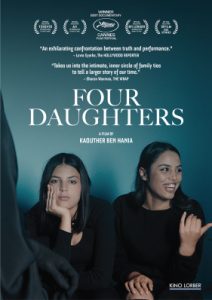
“Four Daughters” (“Les filles d’Olfa”)
(France/Saudi Arabia/Germany/Tunisia/Cyprus)
Metacritic (4/10), Letterboxd (2/5), Imdb.com (4/10), TMDB.com (2/5)
Fusing fact and fiction is a precarious undertaking for a filmmaker, especially when it comes to matters of clarity and credibility. And that’s where this latest offering from writer-director Kaouther Bin Hania misses the mark. This fact-based story about Olfa Hamrouni, a Tunisian single mother who loses her two eldest daughters, Ghofrane and Rahma, to the radical recruitment efforts of ISIL while trying to protect her two youngest daughters, Eya and Tayssir, from befalling a comparable fate struggles mightily to tell a coherent tale. The film clumsily mixes interviews with family members and dramatic reenactments of significant events featuring actors portraying the principals (some inexplicably playing several roles). To complicate matters, this release features an inordinate amount of superfluous material as well as seemingly important gaps in the story, often leaving viewers scratching their heads about how the narrative gets from one unrelated (and sometimes seemingly contradictory) development to the next. Add to that a relevant revelation that doesn’t appear until late in the film (with virtually no prior back story to support it), and you’ve got a patchwork accounting of what otherwise appears to be a moving and heartfelt tale that deserves greater intelligibility and a better overall delivery. What’s more, this offering includes a considerable amount of material about how this production is being put together, a modestly interesting sidebar that might make for an informative bonus feature, but the inclusion of these largely incidental segments within the primary narrative adds little and serves more to needlessly bog down the flow of the film. Given the foregoing, I’m at a loss to understand why this “documentary” (a term I use loosely) has received the amount of attention and adulation that it has garnered, especially in film festival and awards season competitions. Bin Hania has indeed established herself as a talented filmmaker in other releases (especially those of a purely fictional nature), such as the outstanding Oscar-nominated offering, “The Man Who Sold His Skin” (2020), but she seems out of her league here. That’s unfortunate since Olfa’s saga is one that appears to be well worth telling and doesn’t receive the treatment it truly deserves.




Leave A Comment